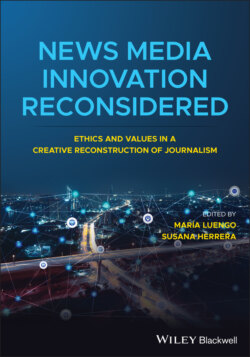Читать книгу News Media Innovation Reconsidered - Группа авторов - Страница 43
Conclusion: Duties for Democratic Journalism
ОглавлениеThe nature of the global media sphere entails that democratically engaged journalism should take on a number of tasks. Democratically engaged journalists protect egalitarian democracy by honoring at least four duties:
1 to advance democratic dialog across racial and economic divides;
2 to explain and defend pluralistic liberal democracy against its foes;
3 to act as a watchdog for the public against extreme or intolerant media;
4 to develop guidelines for covering democracy-weakening trends.
Let us delve a little deeper into each of the four duties.
Duty 1: Dialog across divides
Journalists have a duty to convene public fora and provide channels of information that allow for frank but respectful dialog across divisions. They should seek to mend the tears in the fabric of the body politic. They should work against the trend where confrontation replaces reasonable discussion; and fear of the “other” replaces an openness to humanity. Dialogic journalism challenges racial and ethnic stereotypes and policies, e.g., investigating the factual basis of new and strident immigration laws. It means opposing the penchant to demonize. It means exposing the perpetrators and supporters of hate speech. Whether a dialog occurs depends not only on the speakers but on the manner in which their encounter in the media is structured. A heavy ethical burden lies on the shoulders of media producers, editors, and hosts to design dialogic encounters on their programs and online fora. We are all too familiar with the provocative “journalists” who seek ratings through disrespectful ranting and heated confrontation with guests. But we also have good dialogic examples on public television where viewpoints are critiqued on the basis of facts, not on the basis of the ethnicity or the personal details of the speaker.
Duty 2: Go deep politically
However, fostering the right sort of democracy-building conversations is not enough.
Conversations need to be well-informed. Here is where the second duty arises. Journalism needs to devote major resources to an explanatory journalism that delves deeply into the political values, processes, and institutions of egalitarian democracy, while challenging the myths and fears surrounding issues such as immigration, terrorism, and so on. There is a movement toward fact-checking websites. It is a good idea but insufficient. It is not enough to know that a politician made an inaccurate statement. Many citizens need a re-education in liberal democracy. They will be called on to judge issues that depend on civic knowledge. A democracy without a firm grasp on its principles is flying blind.
Duty 3: Watchdog for extremism
Journalists, in league with democratic civic groups, should help society detox the public sphere by fostering education on the nature of today’s media sphere, the difference between reliable and unreliable media, and the norms that all of us should honor when we use our media devices. In particular, it would advance understanding of the nature and history of extremism and anti-democratic groups, and their strategies. This would be a development of media literacy across society. Also, journalists should monitor the online news world and help citizens become aware of extreme media operators.
Duty 4: Guidelines on extremism
Within journalism ethics, journalists should continue to work on specific guidelines that help them become aware of the totalitarian and intolerant aspects of emerging groups and political leaders. These guidelines could range from general “indexes” for identifying extremists or totalitarian leaders in one’s own democracy to more specific guidelines on how to cover leaders who indulge in hate speech and conspiracy theory.37
In the end, democratically engaged journalists should have the courage to oppose intolerant groups that threaten egalitarian democracy, and not shrink from characterizing a leader as a liar or a totalitarian, where the facts warrant. When such leaders are not opposed or revealed for what they are, a neutral, disengaged journalism only smooths the path to their rise in power. In the face of such dangers, democratically engaged journalists have an ethical right to be prickly, non-neutral, and engaged.
